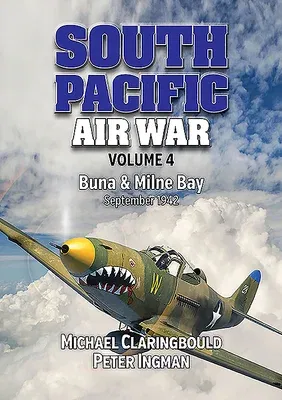Volume Four chronicles aerial warfare in the South Pacific in the
critical period between 19 June and 8 September 1942. It can be read
alone or as a continuation of the first three volumes that spanned the
first six months of the Pacific War, culminating in the Battle of the
Coral Sea.
Unlike the previous three volumes, no aircraft carriers appeared in New
Guinea waters. Instead, the air war was fought solely by land-based air
units. This was in the face of an increasingly complex strategic
situation that saw the Japanese land at both Buna and Milne Bay. For the
first time, airpower in the theater was tasked to support the land
forces of both sides which became engaged in a bloody struggle in the
mountains of Papua and then the narrow muddy quagmire of Milne Bay.
Two veteran Japanese air groups, the Tainan and No. 4 Kokutai, continued
their Herculean struggle against mounting Allied opposition. In the face
of continued attrition, Japanese pilots had many notable successes
including several coveted aerial victories against B-17s. Then, from
August a plethora of fresh Japanese units arrived in theater including
the No. 2, No. 6, Chitose, Misawa and Kisarazu Kokutai.
USAAF P-39s and RAAF P-40Es responded with low level close support
missions and B-25s, B-26s and B-17s ramped up an unrelenting bombing
campaign. Towards the end of the period A-20A strafers made their combat
debut, portending a radical blueprint for future attack tactics in the
theater.
Never before has this campaign been chronicled in such detail, with
Allied accounts matched against Japanese records for a truly factual
account of the conflict.

